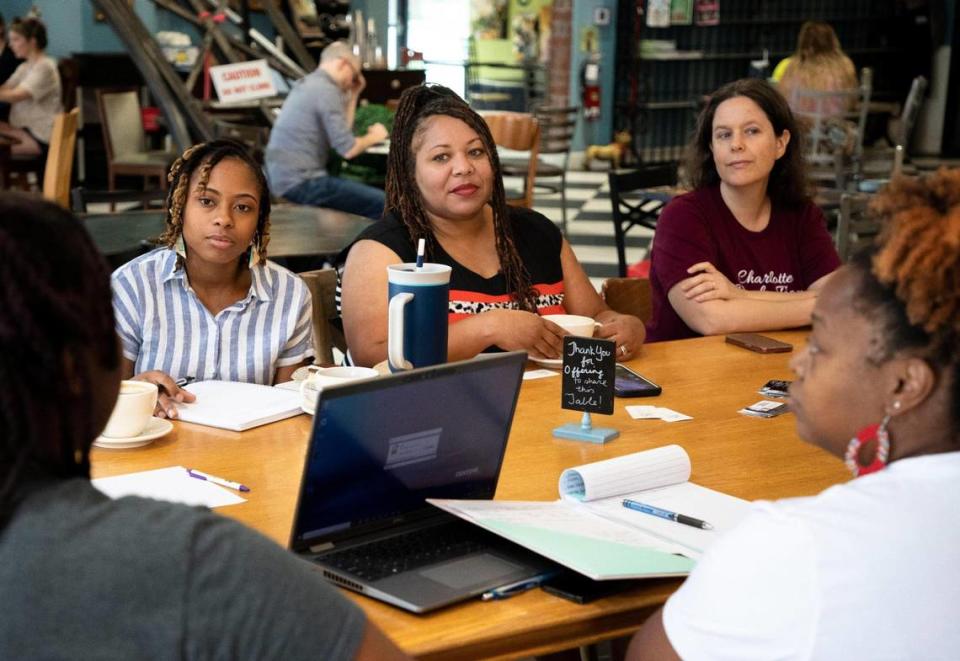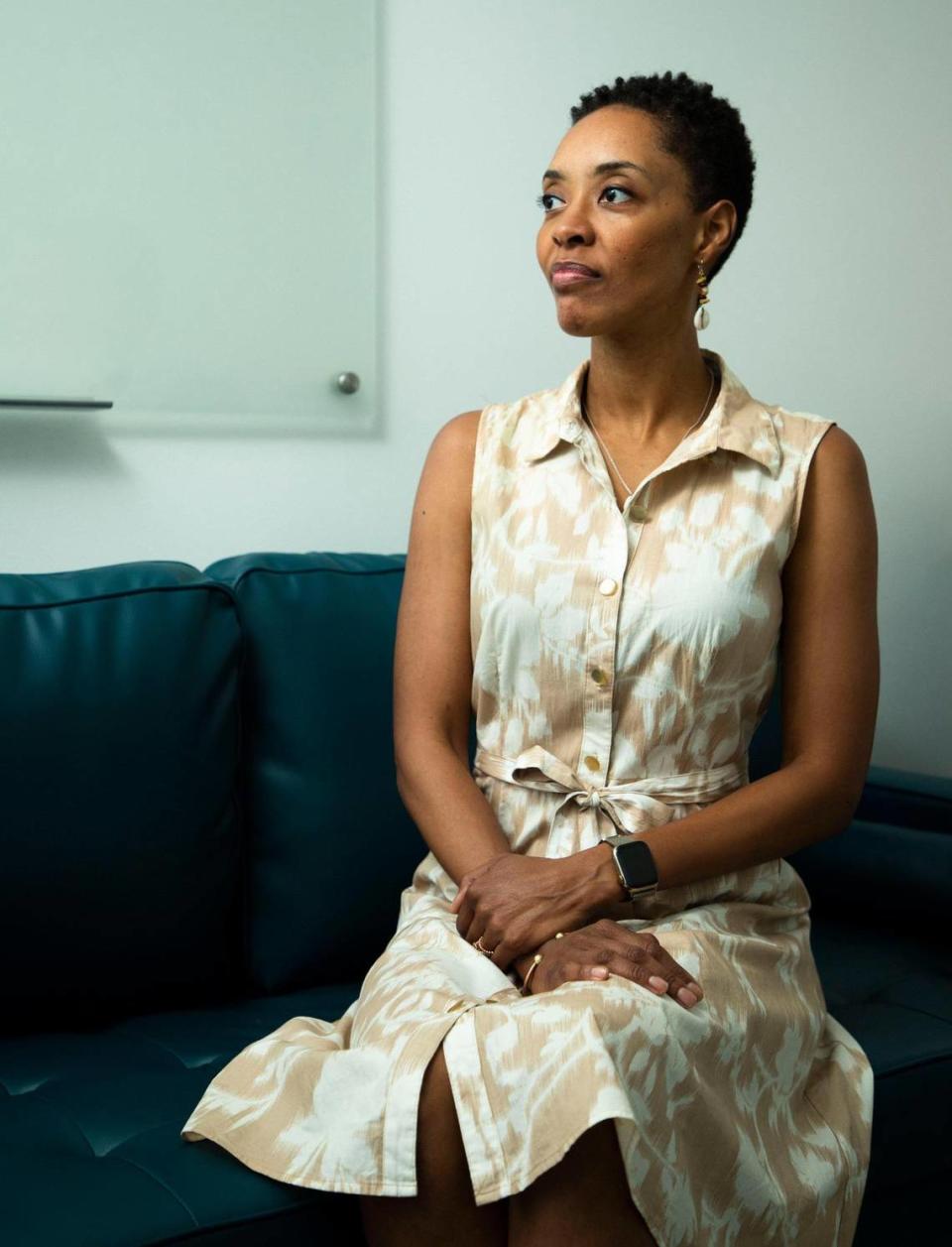Charlotte women strive for better outcomes amid NC’s high Black maternal death rate
Five years ago, Karen Darlington Phelps approached the dawn of perhaps her biggest and most blissful adventure — motherhood.
So when several news stations began airing special reports on the escalating rates of Black women dying during childbirth, or shortly after, Phelps paused to listen.
The data wasn’t new. Many agencies, including the National Institutes of Health have highlighted enduring health inequities for Black women, especially during pregnancy. Suddenly all the jaw-dropping, supporting data — spiking death rates nearly three times that of white women — seemed to be everywhere.
“It frightened me. I was embarking on that journey — and didn’t want to die in the process,” says Phelps, a Charlotte-based attorney who is African American. “I sought alternative methods.”
Alternatives included using a midwife at a birthing center with practitioners who looked like her and offered the cultural nuance she sought. Phelps enjoyed the experience and felt supported and “visible” during her pregnancy. Before her daughter’s birth, she found a doula to be her advocate during labor.

It also inspired her to get more involved with helping others. In addition to her law practice, Phelps is a board member with Queen City Cocoa B.E.A.N.S. and Harmony Nutrition & Lactation LLC, Charlotte-based nutrition and lactation nonprofits.
Like Phelps, other Black North Carolinians in and near Mecklenburg County are stepping forward to help pregnant women from underrepresented groups get the support they need. Weary from hearing the same stories about inequity in maternal health, they are carving better paths for expectant mothers.
Those paths have led to increased access to needed services in Black maternal health by creating spaces to educate, encourage and empower, which in the long term could lead to better pre- and-postnatal outcomes, research says.
“They’re all an integral part of the solution now,” Phelps said.
Far worse for Black women
Black North Carolinians from 2018 to 2021 were more than twice as likely to die from pregnancy-related complications than white residents, according to a News & Observer and Charlotte Observer analysis.
Those stats come in advance of more remarkable data. Since the pandemic, pregnancy-related deaths have almost doubled in the Tar Heel state and are higher than in some other states.
Research says a confluence of factors contribute: higher health risks, bias and racism in medicine. A 2021 U.S. Commission on Civil Rights statutory enforcement report examined possible reasons for racial disparities in maternal health outcomes and how these disparities impact women of color.
Among them were inequities in social determinants of health, such racial disparities in maternal health, poverty and health care access, the report stated.
Black mothers here and across the country were dying from pregnancy-related problems in higher numbers even before the pandemic.
“Any issue that’s going to appear in the pregnant population in general is going to be exacerbated when you think about a person of color,” says Venus Standard, who runs a program for Black doulas, specialists in advocating for women during labor, at UNC Health.
Family members or doulas often act as advocates for Black pregnant women, who often have their concerns ignored or brushed aside, Standard said. But during the height of the pandemic, many women were left without somebody on their “side of the table,” she said.
Professional success, celebrity and fortune also are not safeguards against the higher risks Black women face. They touch the affluent and the destitute.
Gold medal-winning track star Torie Bowie, who died in June, is one example of someone who, from a distance, might have seemed immune.
Among the causes of death on the Olympian’s autopsy report was eclampsia, a complication from childbirth, the New York Times reported in June.
She was 32 years old.
How doulas can help
During her first birthing experience, Kira Kimball felt more like a spectator at the event than an active participant, the mother of four said.
As her children grew, she organically began collecting knowledge about raising healthy babies and parenting. Many friends, associates and family sought her advice on birthing.
It became a calling.
When opportunities in her field waned, the former newspaper marketing and sales manager did some soul searching.
“I was already kind of doing the work of a doula,” Kimball said. “I decided to kind of pursue that direction because that’s where my heart was leading me.”
In 2013, Kimball started Mine-R-T Doula Company, based in Charlotte.

Being a solo certified doula in Mecklenburg and nearby counties was rewarding but also eye-opening. Digging into this new universe, she realized that as Black woman, her own negative and unpleasant experiences weren’t unique.
She noticed a curious pattern. The stories from the women of color she helped and their experiences with providers were not only similar, they were repetitive.
They were “stories about being ignored, not having your questions answered, having information dumbed down, or withheld from you, regardless of your educational background and your ability to understand,” she said. There was more: “not being fully informed of your options and everything that’s available, and being told what are risks and side effects, so that you have a voice in making decisions about your care,” Kimball said.
A doula is not a clinician, but a birthing professional and an advocate for expectant parents who can explain options for care, as well as give support, she said. Equally important is having a pool of doulas with similar ethnicities and cultural understanding — which is desperately needed.
“And make sure that you’re aware of alternatives to really help you make decisions that kind of help you avoid a lot of these traumatic experiences,” Kimball said.
Creating safe spaces
Proponents for breastfeeding say there is a critical need to educate mothers and birthing families from communities of color about its benefits.
Breastfeeding improves health outcomes for infants and mothers, research shows, but there is a racial breastfeeding disparity gap, says Rachel Dean, a international board-certified lactation consultant and a dietitian.
Dean, who has worked in the field for more than a decade, stepped into what she felt was her life’s purpose — to increase representation in the ranks of lactation specialists and ensure more women of color have access to this expertise.
At 34, she already has credentials ranging from a master’s in public health. That training led her to roles from hospitals to academia. She started a lactation consultant certification program at Johnson C. Smith University — which she led in its infancy.
But it was working with clients that led her to notice a common theme.
“I just always felt like there were gaps in care, specifically for people who looked like me,” Dean told The Charlotte Observer.
With the trends in Black maternal health and child health inequities, these issues present as a public health crisis, she said. And one of things that help is for women of color to see providers who look like them.
To help, Dean and four others, started Queen City Cocoa B.E.A.N.S/Harmony NL, which works to support good nutrition and infant feeding in families of color.
The goal was “to create a safe space that was intentionally addressing both the inequities in lactation support and chronic disease management that plagues our communities,” Dean said.
But last year, when it came time for Dean’s pregnancy journey, all of her education, knowledge and resources almost didn’t save her.
When she went into labor, her doula was there but her core clinical team, including a midwife and obstetrician, were not available. So she was switched to a different set of doctors.
Already two weeks past her due date, Dean had trouble in the delivery room, including a slowly dilating cervix, contracting abdominal muscles and her baby entangled within. In what seemed to her like a quick decision, she was being prepped for a C-section, surgery that took two hours.
Dean felt the doctors were rushing and acting as if they just wanted to get the birth over and done.
“It was pretty traumatic,” Dean said.
The nightmare didn’t end there. A week after her son was born, Dean found herself back in emergency with fluid building up in her lungs; heart issues and other health problems.
The final diagnosis was postpartum preeclampsia, a rare and serious condition, which can happen up to six weeks after giving birth and can be fatal.
“It all just makes me want to fight harder for women and want to do what we do with Cocoa B.E.A.N.S, even more.”
The nonprofit has grown to 20 team members, including men, who oversee different programs and activities across Mecklenburg County.
Recently, the nonprofit received $385,000 from Blue Cross Blue Shield of North Carolina to help with its goals to teach breastfeeding and offer more support to mothers and birthing families from communities of color.
Normalizing better outcomes
Some Black advocates for improving mothers’ health say conversations about disparities in Black maternal health should center on root causes, such as systemic racism in health care — including believability issues.
Doulas are a tool, Kimball said. They are doing their part to help those families who choose this path, including not ignoring warning signs and offering a safe space if expectant parents are experiencing something abnormal, she said.
They aren’t the sole solution.
“There’s structural racism within the healthcare system. Those are things that need to be addressed before we can see improvement and changes we would like to see more of,” Kimball said.
There are telltale signs to watch out for preeclampsia or other issues, Dean notes. They can include stomach pain, shortness of breath, headaches, nausea, seeing spots and swelling in hand and feet to chest pain, disorientation and gaining more than 5 pounds in one week.

Phelps would like to see more information made more available to Black women and more conversations about it — as in women talking within the community, women to women, mother to daughter, even father to mother, she says.
“Just have more of this become a part of our dialogue. That’ll certainly carry over,” she says.
News & Observer investigative reporter Tyler Dukes and medical reporter Teddy Rosenbluth contributed to this article.


